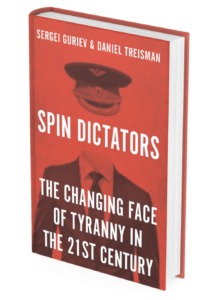While Russian President Vladimir Putin brazenly violates international law on the Ukrainian front, his lobbyists in Western capitals operate in covert ways that allow for plausible deniability, notes Sergei Guriev, Provost and Professor of Economics at Sciences Po. As I show in my recent book Spin Dictators, co-authored with Daniel Treisman, this is how the majority of nondemocratic regimes now function, he writes for Project Syndicate:
- The first step toward meeting the threat on the Western front is to acknowledge the problem. Until recently, Western politicians who supported and carried water for Putin paid no reputational cost whatsoever. And though most now feel obliged to say that they oppose the war, they continue to argue that sanctions should be removed. These politicians’ links to autocratic regimes should be investigated. If they are found to have broken the law, they should be punished; and if they are acting on autocrats’ behalf but operating in a grey area, they should be shamed, and new laws should be written to close off those channels of influence.
 Second, the West should reduce its dependence on trade with autocracies. Fortunately, this has already begun with the push toward “friend-shoring,” a concept that is more economically sound than its critics allow, considering that the costs of war can easily outweigh the marginal gains from trade with autocracies.
Second, the West should reduce its dependence on trade with autocracies. Fortunately, this has already begun with the push toward “friend-shoring,” a concept that is more economically sound than its critics allow, considering that the costs of war can easily outweigh the marginal gains from trade with autocracies.- Finally, the West should pay more attention to autocrats’ penetration of international organizations. One need not look far to see why this is a problem. Since 2021, Interpol has been run by an Emirati general who has been credibly accused of committing torture. And just this year, Hungary’s membership in the European Union significantly delayed the EU’s embargo on Russian oil, and Turkey’s membership in NATO threatened to derail membership bids by Finland and Sweden.
Authoritarians don’t fear the West as much as losing control of their own people, argues former National Security Adviser H. R. McMaster (above).
 Instead of retrenchment, policymakers should adopt what the historian Zachary Shore calls “strategic empathy”: an understanding of the ideology, emotions, and aspirations that drive and constrain other actors, he contends.
Instead of retrenchment, policymakers should adopt what the historian Zachary Shore calls “strategic empathy”: an understanding of the ideology, emotions, and aspirations that drive and constrain other actors, he contends.
Strategic empathy might help at least some advocates of retrenchment qualify their adamant opposition to democracy promotion and human rights advocacy abroad and allow them to accept that the United States cannot determine, but can influence, the evolution of a world in which free and open societies flourish.







